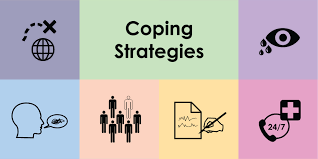In today’s fast-paced, digitally-driven society, the prevalence of mental health challenges has become increasingly evident. From the constant barrage of information on social media to the pressures of maintaining an online presence, individuals are facing unique stressors that can take a toll on their mental well-being. However, amidst this digital chaos, there are coping strategies that can help navigate the complexities of the modern world while safeguarding mental health.
Understanding the Digital Landscape:

Before delving into coping strategies, it’s essential to understand the impact of the digital age on mental health. Social media platforms, while connecting individuals across the globe, can also cultivate feelings of inadequacy and comparison. The constant stream of curated content often leads to unrealistic expectations and a distorted perception of reality.
Additionally, the 24/7 accessibility provided by digital devices blurs the boundaries between work and personal life, contributing to heightened stress levels and burnout. The omnipresence of technology can disrupt sleep patterns, impair interpersonal relationships, and exacerbate feelings of loneliness and isolation.
Coping Strategies for Mental Well-being:

- Digital Detox: Periodically disconnecting from digital devices can provide much-needed relief from the constant stimuli of the online world. Designate specific times throughout the day to unplug completely, engaging instead in activities that promote relaxation and mindfulness.
- Set Boundaries: Establishing clear boundaries with technology usage is crucial for maintaining balance. Create designated no-phone zones in your home or establish specific times for checking emails and social media. Communicate these boundaries to friends, family, and colleagues to ensure mutual respect and understanding.
- Practice Mindfulness: Incorporate mindfulness practices into your daily routine to cultivate awareness and reduce stress. Whether through meditation, deep breathing exercises, or mindful walking, taking moments to ground yourself in the present can foster a sense of calm amidst the chaos of the digital world.
- Cultivate Offline Connections: Prioritize face-to-face interactions and nurture meaningful relationships outside of the digital realm. Engage in activities that foster genuine connections, such as joining a club or volunteering in your community. Investing in offline relationships can provide a sense of belonging and support that is often lacking in the digital sphere.
- Limit Screen Time: Set limits on your screen time and be mindful of the content you consume online. Unfollow accounts that trigger negative emotions or feelings of inadequacy, and curate your digital environment to prioritize positivity and authenticity. Use screen time tracking apps to monitor and regulate your usage effectively.
- Seek Professional Support: If you’re struggling to cope with the challenges of the digital age, don’t hesitate to seek professional help. Whether through therapy, counseling, or support groups, trained professionals can provide valuable guidance and support tailored to your individual needs.
Conclusion:
Navigating mental health in the digital age requires a proactive approach and a commitment to self-care. By implementing coping strategies such as digital detox, setting boundaries, practicing mindfulness, cultivating offline connections, limiting screen time, and seeking professional support, individuals can effectively safeguard their mental well-being amidst the complexities of the modern world. Remember, prioritizing your mental health is not a luxury but a necessity in today’s digital landscape.


